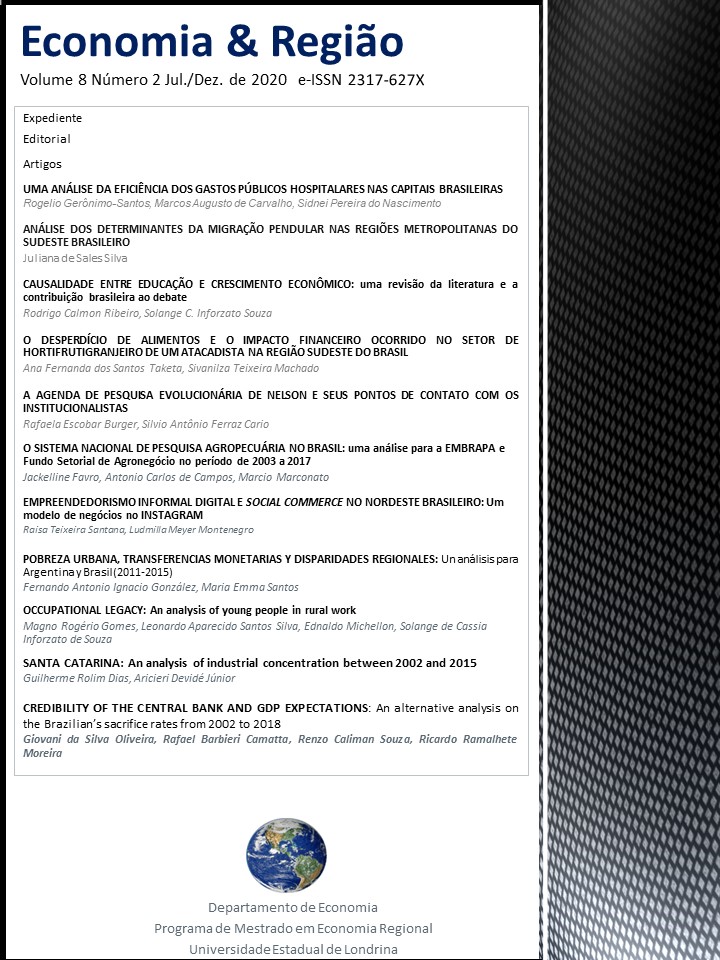Empreendedorismo Informal Digital e Social Commerce no Nordeste brasileiro: Um Modelo de Negócios no Instagram
DOI:
https://doi.org/10.5433/2317-627X.2020v8n2p129Palavras-chave:
Empreendedorismo Informal Digital, Social Commerce, Instagram.Resumo
O empreendedorismo informal digital abrange atividades econômicas no ambiente virtual O empreendedorismo informal digital envolve atividades econômicas no ambiente virtual como as redes sociais virtuais e que não são reguladas pelas autoridades públicas. Assim, as atividades econômicas que ocorrem nessas plataformas sociais são denominadas social commerce. Este artigo objetiva averiguar o empreendedorismo informal digital por meio do Instagram no Nordeste. O estudo tem natureza qualitativa e é do tipo exploratório e descritivo. Os dados foram coletados por meio de entrevistas semiestruturadas e observação não-participante e foram analisados por meio da análise de conteúdo. Os resultados da investigação indicam que os perfis dos donos de negócio não são tão distintos. Motivações como facilidade para acesso de novos mercados, aumento da exposição dos produtos e oportunidade estão entre as mais citadas. Já as dificuldades mais abordadas foram conseguir seguidores, somente visão e audição (som) podem ser utilizados e funcionalidades ruins. Assim, o s-commerce é algo recente, não sendo possível afirmar se a realidade encontrada nesta pesquisa irá prevalecer com o passar dos anos.
Downloads
Referências
ADNEWS. Infográfico mostra perfil do usuários brasileiro no Instagram. Disponível em: http://adnews.com.br/internet/infografico-mostra-perfil-do-usuario-brasileiro-no-instagram.html. Acesso em: 18 jan. 2018.
AFRASIABI RAD, A.; BENYOUCEF, M. A model for understanding social commerce. Journal of Information Systems Applied Research, v. 4, n. 2, p. 63-73, 2011.
ASSOCIAÇÃO BRASILEIRA DO VESTUÁRIO - ABRAVEST. Panorama do Setor. Disponível em: http://abravest.org.br/site/abravest-2/panorama-do-setor/. Acesso em: 24 jun. 2018.
BAGHDADI, Y. From e-commerce to social commerce: a framework to guide enabling cloud computing. Journal of theoretical and applied electronic commerce research, v. 8, n. 3, p. 12-38, 2013.
BARDIN, L. Análise de Conteúdo. São Paulo: Edições 70, 2011.
BUSALIM, A. HUSSIN, A. R. C. Understanding social commerce: A systematic literature review and directions for further research. International Journal of Information Management, v. 36, n. 6, p. 1075-1088, 2016.
CALAIS, Isabela; Santos, Emerson Gomes dos. Barreiras no uso das mídias sociais como ferramentas de marketing digital pelos microempreendedores individuais. In: ENCONTRO DE MARKETING DA ANPAD, 7., 2016, Belo Horizonte/MG. Anais [...]. Belo Horizonte: ANPAD, 2016. p. 1-3, 2016.
COZER, M. T. S. Interação com Clientes Na Economia Digital: Um Estudo de Caso Múltiplo. Journal of Information Systems and Technology Management: JISTEM, v. 4, n. 2, p. 217-234, 2007.
DAVIDSON, E.; VAAST, E. Digital entrepreneurship and its sociomaterial enactment. In: System Sciences (HICSS), 2010 43rd Hawaii International Conference on IEEE, 2010. p. 1-10.
DEMAILLY, C. The Business Impact of Social Networking. Disponível em: https://www.business.att.com/content/whitepaper/WP-soc_17172_v3_11-10-08.pdf . Acesso em: 18 jan. 2018.
DOMINGUES, A. A. Digital Entrepreneurship: a study on the use of technology as a business generation in educational startups. In: 14th International Conference in Information Systems e Technology Management- CONTECSI, São Paulo, p. 5071-5078, 2017.
ERDOÄžMUÅž, Ä°. E.; TATAR, Åž. B. Drivers of Social Commerce through Brand Engagement. In: 11 th International Strategic Management Conference, 2015. p. 189 - 195. Disponível em https://www.semanticscholar.org/paper/Drivers-of-Social-Commerce-through-Brand-Engagement-Erdogmus-Tatar/cb963156ba37b1378fa8140834e2ec4f8b4c71ce. Acesso em: 18 jan. 2018.
FISCHER, E.; REUBER, A. R. Social interaction via new social media:(How) can interactions on Twitter affect effectual thinking and behavior?. Journal of business venturing, v. 26, n. 1, p. 1-18, 2011.
GASKELL, G. Entrevistas individuais e grupais. In: GASKELL, G. Pesquisa qualitativa com texto, imagem e som: um manual prático. Petrópolis, RJ: Vozes, 2002. v. 2, p. 64-89
GASPARÄ–NIENÄ–, L. et al. Level and sectors of digital shadow economy: the case of Lithuania. Entrepreneurship and sustainability issues, v. 4, n. 2, p. 183-197, 2016.
GASPARÄ–NIENÄ–, L. et al. The methodology of digital shadow economy estimation. E+ M Ekonomie a Management, v. 20, n. 4, p. 20-33, 2017.
GASPARÄ–NIENÄ–, L.; REMEIKIENE, R. Digital shadow economy: A critical review of the literature. Mediterranean Journal of Social Sciences, v. 6, n. 6 S5, p. 402-409, 2015.
GASPARÄ–NIENÄ–, L.; REMEIKIENÄ–, R.; SCHNEIDER, F. G. Concept, motives and channels of digital shadow economy: consumers' attitude. Journal of Business Economics and Management, v. 18, n. 2, p. 273-287, 2017.
GENÇ, M.; ÖKSÃœZ, B. A Fact or an Illusion: Effective Social Media usage of Female Entrepreneurs. Procedia-Social and Behavioral Sciences, v. 195, p. 293-300, 2015.
GIACOMIN, O.; JANSSEN, F.; GUYOT, J.L ; LOHEST, O. Opportunity and/or necessity entrepreneurship? The impact of the socio-economic characteristics of entrepreneurs. 2011. Disponível em: https://mpra.ub.uni-muenchen.de/29506/. Acesso em: 3 maio 2018.
GODFREY, P. C. Toward a theory of the informal economy. Academy of Management Annals, v. 5, n. 1, p. 231-277, 2011.
GOLBECK, J.. Introduction to Social Media Investigation: A Hands-on Approach. Syngress, 2015.
GOMES, R.de C. de O. Empreendedor X E-Empreendedor. RECADM, v. 2, n. 1, p. 1-17, 2003.
GRAY, D. E. Pesquisa no Mundo Real. 2 ed. Porto Alegre: Penso, 2012.
HAJLI, M. A research framework for social commerce adoption. Information Management & Computer Security, v. 21, n. 3, p. 144-154, 2013.
HULL, C. E.; HUNG, Y.T.; HAIR, N.; PEROTTI, V.; DEMARTINO, R.
Taking advantage of digital opportunities: a typology of digital entrepreneurship. International Journal of Networking and Virtual Organisations, v. 4, n. 3, p. 290-303, 2007. Disponível em https://www.researchgate.net/publication/220449463_Taking_advantage_of_digital_opportunities_A_typology_of_digital_entrepreneurship. Acesso em: 11 de fevereiro de 2020.
HUNG, S.; YU, A.; CHIU, Y. Investigating the factors influencing small on-line vendors' intention to continue engaging in social commerce. Journal of Organizational Computing and Electronic Commerce, v. 28, n. 1, p. 9-30, 2018.
INSTAGRAM. Instagram Press: Our Story. Disponível em: https://instagram-press.com/our-story. Acesso em: 19 jan. 2018.
KIM, D. Under what conditions will social commerce business models survive? Electronic Commerce Research and Applications, v. 12, n. 2, p. 69-77, 2013.
LATIFF, Z. A; SAFIEE, N. A. S. New Business Set Up for Branding Strategies on Social Media-Instagram. In: THE THIRD INFORMATION SYSTEMS INTERNATIONAL CONFERENCE, 2015, Surabaya, Indonesia. Proceeding [... : Surabaya: ISICO, 2015. p. 13 - 23.
LINDSEY-MULLIKIN, J.; BORIN, N. Why strategy is key for successful social media sales. Business Horizons, v. 60, n. 4, p. 473-482, 2017.
MARCONI, M. de A; LAKATOS, E. M. Fundamentos de Metodologia Científica. São Paulo: Atlas, 2017.
NAMBISAN, S. Digital entrepreneurship: Toward a digital technology perspective of entrepreneurship. Entrepreneurship Theory and Practice, v. 41, n. 6, p. 1029-1055, 2017.
PARAISO, G. J. B. O E-Commerce nas redes sociais: estudo sobre os desdobramentos do comércio eletrônico na atualidade. Biblioteca on-line de Ciências da Comunicação, 2011.
PASCHOAL, A. de S; LUMIKOSKI, A. C.; BUENO, B. S.; SOUZA, C. T. M. Economia Informal: desafios ao estabelecimento de padrões de trabalho decente. Indivíduo, Sociedade e Autonomia: caminhos para a dignidade humana. Brasília: Editora da UNB, 2013.
PHUA, J.; JIN, S. V.; KIM, J. J. Gratifications of using Facebook, Twitter, Instagram, or Snapchat to follow brands: The moderating effect of social comparison, trust, tie strength, and network homophily on brand identification, brand engagement, brand commitment, and membership intention. Telematics and Informatics, v. 34, n. 1, p. 412-424, 2017.
SANCHEZ, M. J. Com 50 milhões de usuários, Brasil é segundo no ranking do Instagram. Disponível em: http://www1.folha.uol.com.br/mercado/2017/10/1931057-com-50-milhoes-de-usuarios-brasil-e-segundo-no-ranking-do-instagram.shtml. Acesso em: 18 jan. 2018.
SCHNEIDER, F.; BUEHN, A. Estimating the size of the shadow economy: Methods, problems and open questions. ECONSTOR, 2013. Disponível em:https://www.econstor.eu/bitstream/10419/97444/1/773137262.pdf. Acesso em: 18 jan. 2018.
SEBRAE. Empreendedorismo Digital: Algumas boas perguntas para sua reflexão. Disponível em: http://www.bibliotecas.sebrae.com.br/chronus/ARQUIVOS_CHRONUS/bds/bds.nsf/47D4BCB49B5EE0CB8325768F006C7FE0/$File/NT00042F1A.pdf. Acesso em: 7 out. 2017.
SOUZA, M. de; SCHOEFFEL, P. Panorama atual do social commerce no Brasil. REAVI-Revista Eletrônica do Alto Vale do Itajaí, v. 2, n. 2, p. 161-164, 2013.
SPC Brasil. Relatório de Pesquisa Mercado Informal. Disponível em: https://www.spcbrasil.org.br/uploads/st_imprensa/analise_spc_brasil_mercado_informal.pdf. Acesso em: 18 jan. 2018.
VERGARA, S. Ct. Projetos e relatórios de pesquisa em Administração. 11.ed. São Paulo: Atlas, 2009. 94p.
VISENTINI, M.; CHAGAS, F.; BOBSIN, D. Análise Bibliométrica das Pesquisas sobre redes sociais virtuais publicadas em âmbito nacional. Anais do SEPE-Seminário de Ensino, Pesquisa e Extensão da UFFS, v. 5, 2015.
WANG, C.; ZHANG, P. The evolution of social commerce: The people,
management, technology, and information dimensions. Communications of the Association for Information Systems, v. 31, n. 5, p. 1-23, 2012.
WEBB, J. W. et al. Research on entrepreneurship in the informal economy: Framing a research agenda. Journal of Business Venturing, v. 28, n. 5, p. 598-614, 2013.
WELTER, F.; SMALLBONE, D.; POBOL, A. Entrepreneurial activity in the informal economy: a missing piece of the entrepreneurship jigsaw puzzle. Entrepreneurship & Regional Development, v. 27, n. 5-6, p. 292-306, 2015.
WILLIAMS, C. C. Informal entrepreneurs and their motives: a gender perspective. International Journal of Gender and Entrepreneurship, v. 1, n. 3, p. 219-225, 2009.
ZHOU, L.; ZHANG, P.; ZIMMERMANN, H. Social commerce research: An integrated view. Electronic commerce research and applications, v. 12, n. 2, p. 61-68, 2013.
Downloads
Publicado
Como Citar
Edição
Seção
Licença
Copyright (c) 2020 Economia & Região

Este trabalho está licenciado sob uma licença Creative Commons Attribution 4.0 International License.
Economia & Região adota a Licença Creative Commons Attribution CC-BY 4.0 International, portanto, os direitos autorais relativos aos artigos publicados são do(s) autor(es), que cedem à Revista Economia & Região o direito de exclusividade de primeira publicação.
Sob essa licença é possível: Compartilhar - copiar e redistribuir o material em qualquer suporte ou formato. Adaptar - remixar, transformar, e criar a partir do material, atribuindo o devido crédito e prover um link para a licença e indicar se mudanças foram feitas.




















